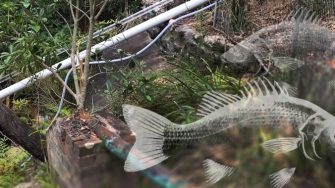UNSW Tube Fishway team succeeds in lifting fish above 8 m
Aiming to restore fish migration across dams and weirs, UNSW researchers are combining their expertise in fish ecology and hydraulic engineering to develop a Tube Fishway.
Aiming to restore fish migration across dams and weirs, UNSW researchers are combining their expertise in fish ecology and hydraulic engineering to develop a Tube Fishway.

An interdisciplinary team of researchers from UNSW’s Water Research Laboratory (WRL) and the Centre for Ecosystem Science (CES) have created the Tube Fishway, which sets out to provide effective upstream fish passage through a tube using a conduit system. One tube accelerates water from an upstream reservoir and a second tube delivers the fish at near atmospheric pressure to an elevation in excess of the water level in the upstream reservoir.
Following successful earlier trials with laboratory models of 1 m and 4 m in height, the team has now succeeded in lifting live fish (Australian Bass) above 8 m in height in a real-scale inclined model at WRL. No fish were injured during the trials and the fish remained healthy after a monitoring period of 14 days. These tests were an important milestone for the project to reach, moving on to the next stages including the optimisation of fish attraction into the Tube Fishway and upcoming trials at a field site.
The Tube Fishway with transparent delivery pipe at WRL. This 8 m real-scale inclined model has succeeded in lifting live fish.
Tube Fishway in operation lifting an Australian Bass above 8 metres.
Australian Bass arrives safely at 8 m elevation after a ride in the Tube Fishway.
The UNSW Tube Fishway team consists of: